

The Chubb Archive is part of The History of Locks Museum Resources
Contact our curator for more information
© 2004 - 2016

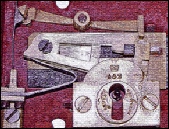
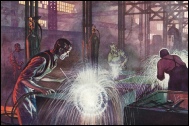
Your one-stop resource for dating & information on vintage and antique Chubb Locks, Safes & Security Equipment
Export is Fun
Mr. D.R.E. Ibbs’ personal memories of his 41 years with Chubb
The Happy Years
About this time, three major events occurred; the Lock and Safe Company started to make the acquisitions from which was finally formed the large security group of companies; Ron Holley became so ill that he retired from work and shortly after that he died; John Benton and Mike Fellows resigned from the export department. Benton joined a former works manager, Leslie Thomas, who had founded a new safe making company and Fellows becoming a management consultant. I believe that the two resignations were linked in that it was becoming obvious Leonard Dunham was destined for higher management and Bill Randall, as the coming man, was likely to become sales director. He had a reputation as a disciplinarian and neither Benton or Fellows were likely to be allowed the latitude granted by Holley, should this occur.
David Uglow joined the department to deal with Africa and parts of the Middle East and Garry Owen, as the most experienced salesman left, took over the Americas and parts of Scandinavia. I carried on with the Far East, North and East Africa. Bob Palmer, who had been confirmed as manager, was not overwhelmed with his new department and described it as two men - himself and Eastwood and a boy, Owen. Thus were Uglow and myself written off!
During Owen's takeover in the Americas, an amusing but significant event occurred. Letters had been written to all involved agents to introduce Garry as the new man. A scathing letter came back from one Caribbean island, as follows:
“We note that Mr Owen is to take over the area and will shortly visit us.
We look forward to this as although we are aware that in the past, Mr Benton paid several visits to the island,
he never saw fit to call on us.”
It was a rather lovely holiday spot!. It was also symptomatic of the attitude held by many in the company at that time.
In my territory, little of note occurred during this period, except to confirm that many of our overseas agents were totally unsuitable for our purposes and produced very little business for us. I also received my first taste of the really unpleasant conditions in many of the North African countries where we operated. During one trip to Ethiopia I suffered very bad insect bites and in desperation liberally powdered myself in DDT. On getting up next morning I discovered seven large dead fleas in the bed.
Many times I suffered from severe stomach upsets but fortunately, streptotriad tablets would always give immediate relief.
As widely expected, Bill Randall became the company’s Sales Director and shortly afterwards moved Bob Palmer to manage the city Banking Department. Bill Bannochie, who’d recently transferred from St James Street to Banking, replaced Bob as Export Manager. I was delighted at all aspects of the moves and so began some of the happiest days of my working life, as an export salesman under Bill Bannochie.
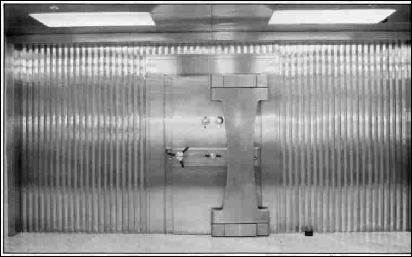 I did one further trip to the Far East and had a major success. In Thailand, our agents, the Anglo Thai Corporation, put a young harum scarum salesman, Julian Dealey, to work with me. During this trip, I received an order for a stainless steel covered vault door, which we had first made for my Midland Bank safe deposit installation and which I felt was ideal for small banks in Thailand. Julian, who as a salesman, had an eye for opportunity, became very interested in the Chubb line and over the next two years, we received a large number of orders for similar vault doors and thus started a period of tremendous success in the area. So much so that it became a very popular calling place for directors, who like to be associated with success.
I did one further trip to the Far East and had a major success. In Thailand, our agents, the Anglo Thai Corporation, put a young harum scarum salesman, Julian Dealey, to work with me. During this trip, I received an order for a stainless steel covered vault door, which we had first made for my Midland Bank safe deposit installation and which I felt was ideal for small banks in Thailand. Julian, who as a salesman, had an eye for opportunity, became very interested in the Chubb line and over the next two years, we received a large number of orders for similar vault doors and thus started a period of tremendous success in the area. So much so that it became a very popular calling place for directors, who like to be associated with success.
For the opening of one very large installation, sold by John Woodhouse some years later, Dick Chapman opted to be in Bangkok for the opening ceremony. After a very liquid lunch, he arrived on site to find the stainless steel vault door covered in White Paper Votive Prayers, placed by the monks at the official blessing. Chapman is quoted as saying "Get that bird shit cleaned off the door, Woodhouse"!
It is interesting to note that after Julian left Anglo Thai, he join forces with a local businessman to take up the Bic agency and ultimately became very wealthy.
In view of the burgeoning business in the Far East, Randall decided the Company needed a full time salesman in the area. In selecting John Woodhouse, domiciled in Singapore, he could not have chosen better. Unfortunately, in years to come, the lack of effective local supervision was to prove fatal.
Following this appointment, Bill Bannochie decided to alter my areas of responsibility. I was given the Middle East,extending as far as East Pakistan (now Bangladesh), but expected to provide all the quotations required for Woodhouse. This was not as onerous as it may sound as I had the advantage of calculating with a slide rule, whereas my colleagues had to calculate longhand. As a result of this it was found I was preparing more than 50% of all the quotations to leave export department. The benefit to me was that after something of a fight with the office manager, Eastwood, I was allowed to have a secretary of my own. For several years Mrs June McGee worked with me to such good effect that during my absences overseas, she was able to prepare quotations and write orders on her own. Thus she became one of the first lady Administrators in the Export Dept.
Initially, I was not very happy when Bannochie transferred me to the Middle East as in many of the countries, we were represented by the National Cash Register Company, who were managed from Beirut by Karl Striebel, a multi-lingual German, with a very excitable nature. Fortunately, after a rather frosty start, Karl and I became good friends; he recognising my engineering ability with Chubb products and I, his superb salesmanship. The NCR system of sales training made a great impression on me and I utilised their methods in my own selling techniques, this being the first formalised sales training I had received.
In the early days of my stewardship to the Middle East, I became the first Chubb salesman to go down the Arabian Gulf as far as Dubai and Sharjah. This was in the days before Abu Dhabi had been developed and the only hotel was The Beach, where one was likely to share a room with a complete stranger, so short was the supply of accommodation. A similar situation occurred in Bahrain, at the Gulf Aviation rest house so it was not altogether a shock to me. My first visit to Abu Dhabi is indelibly engraved on my mind. No one, not even Striebel, could give me guidance on what to expect.
I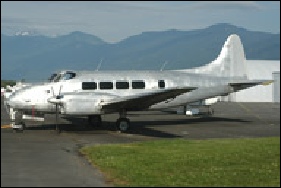 boarded the Gulf Aviation Dove in Bahrain and was told by the BOAC contracted captain, to sit at the front of the aircraft, which involved stepping over the main spar. After a short stop in Qatar, we flew on for about an hour, before starting to circle in the middle of the desert where there were a few oil drums and small hut. I felt that we were about to refuel so when we landed, I remained in my seat. The skipper appeared out of the cockpit, looked at me and said "You're for Abu Dhabi?". I agreed that I was and got out of the aircraft. The skipper also descended. "So where is Abu Dhabi?", I inquired.He pointed towards the horizon where I could just see the top of a chimney which turned out to be the water distillation tower. "How do I get there?, I asked. " Anyone meeting you?" was the reply. When I said "no", he replied "Then you'll have to walk”.
boarded the Gulf Aviation Dove in Bahrain and was told by the BOAC contracted captain, to sit at the front of the aircraft, which involved stepping over the main spar. After a short stop in Qatar, we flew on for about an hour, before starting to circle in the middle of the desert where there were a few oil drums and small hut. I felt that we were about to refuel so when we landed, I remained in my seat. The skipper appeared out of the cockpit, looked at me and said "You're for Abu Dhabi?". I agreed that I was and got out of the aircraft. The skipper also descended. "So where is Abu Dhabi?", I inquired.He pointed towards the horizon where I could just see the top of a chimney which turned out to be the water distillation tower. "How do I get there?, I asked. " Anyone meeting you?" was the reply. When I said "no", he replied "Then you'll have to walk”.
The thought of tramping across the desert with my briefcase and suitcase, dressed in my tropical suit, in the scorching temperature, was daunting indeed. Fortunately, I was reprieved when a Land Rover roared up, driven by two young Europeans. These were employees of the Ottoman bank, one of the two banks established in Abu Dhabi. They took turns with the British Bank, to meet the thrice weekly flight from Bahrain, in order to collect the mail, which was brought down from the Bahrain Post Office, there being no postal facilities in Abu Dhabi. I was given a lift back to Abu Dhabi and instantly had introduction to both banks, whose staff were glad to see a new face.
Walking round the sand tracks which connected various placed in Abu Dhabi, in the blazing sun, was quite an experience but as no one else had bothered to call previously, I received quite a lot of business.
Being a centre for the pearl trade and the port from which gold was smuggled into India, Dubai was much more developed than Abu Dhabi. Almost every flight from Bahrain had gold bullion as part of the cargo and with smuggling considered ‘legal trade’ in Dubai, the trading dhows which sailed to the Indian coast, regularly carried gold in their holds. Almost every businessman in Dubai had a share in the shipments, so if the dhow was intercepted and jettisoned the gold overboard, no one lost too much money. The Indian rupee coin was still legal tender in the Gulf and payments for the gold were made in this currency. The result being that the banks, which were just beginning to expand in the area, had masses of coin to count and repatriate to Bombay.
The discovery of large oil deposits during the 1950s and the subsequent arrival of personnel and equipment to extract it, inevitably led to modernisation in Qatar and the Trucial States (now the United Arab Emirates). During the following decade, one of the many developments was a huge growth in Postal Services. Almost by accident, this led to one of my greatest successes.
One day, during a visit to Bahrain in the mid 1960s, the NCR man with whom I was due to work, did not turn in due to sickness. The manager was most apologetic that he had no-one to escort me so I made my calls on foot, by myself. About 12:30 p.m., I realised I was near the Post Office and had mail to post. At the Post Office, I bent down to extract the letters from my briefcase and in doing so, glanced through the venetian blind on the window and made eye contact with the European sitting inside. He motioned for me to come in for a drink and so I met Richard Thorpe, the sub postmaster from Harlow, Essex, my hometown, who was on loan to Bahrain Post Office. Whilst chatting and drinking my Coca-Cola, I suggested the PO box system might probably be the way forward in England to overcome the shortage of postman. Thorpe disagreed sharply, stating that the box system cost the Post Office a great deal of money. He explained that there were never enough boxes to satisfy demand and as box holders could obtain an extra key from the Post Office for about 2 pounds or get them copied in the souk (local market), the postmaster couldn't restrict the number of keys per box. The renters could then sublet their box to friends and make more money from the box than the Post Office. To prove the point, he showed me a box full of mail addressed to several different people, all having the same box number.
At that time, Chubb had been offered the Ava lock mechanism by its Finnish inventor. As part of the deal, we had the marketing rights for a small barrel lock, using a mechanism which, although giving about 14,000 differs, sold for about 1 pound. One great feature was the unique key; without the correct tools it was very difficult to duplicate. With this in mind I asked the postmaster if he’d buy Chubb PO Boxes providing we could cure his key duplication problem at a reasonable price. He said that if I could truly solve this problem he would be delighted to recommend our boxes, subject to them being reasonably competitive.
And so it was that Chubb produced a rust free box (vitally important in the Gulf) secured with an Ava Cam Lock. With two keys per box, if the Renter ‘lost’ his key the original lock was removed (a very simple operation) and scrapped. A new lock, again with two keys was fitted, all for the original replacement key charge of 2 pounds, which still left the Post Office a profit. The key being almost impossible to duplicate in the souk meant the Post Office again had control and so, almost overnight, the box rental problem was solved.
Over the ensuing years, virtually every Post Office in the Gulf bought Chubb, and many thousands of boxes and spare locks were sold. The business only came to an end, when Mike Dempsey (ex Chatwood Milner) decided to sell the Ava locks to the Kuwait Post Office who then made their own boxes. In the end a number of British box manufacturers were able to obtain the locks and undercut the Chubb prices, due to lower overheads. For more than 15 years however, it was a very lucrative source of business and all the result of a chance encounter!
I spent the next five years on the Middle East area and achieved a number of notable successes, including Intra-Bank Beirut, Arab Bank Beirut and the Central Bank of Jordan. The Intra-Bank being a major contract, I was presented with the company’s standard reward - a ‘Locks’ Bowler Hat! I also received a much reduced order for the Central Bank of Sri Lanka, on which I had been working for some time.
Naturally, there were failures and disappointments as well, one of the worst of these being the Central Bank of Ethiopia, lost to the Americans, who were able to supply secondhand doors at a much lower price than the new equipment from Chubb. However, worst of all was being unable to tender for the Central Bank of Lebanon, due to some very shady dealings - not absolutely unknown in the Middle East, then or now. At that Time, Chubb had very strict rules about offering bribes or commissions although it was in order for agents to use their own commissions to manipulate business on their own account. I have to admit that I was aware my own agents used such arrangements which resulted in a number of large contracts. Probably the worst example of this which came to my notice was one far Eastern contract, where the managing director of the bank's board, received a sum in excess of the total monies received by Chubb and our local agent, for signing the contract.
Some very amusing incidents occurred during these years, two of which spring to mind. It must be appreciated that fast communications between UK and overseas markets were not available in the 1960s; telephone links were very uncertain - one had to wait for hours for connections to be made - and telex machines were not commercially available. We were given commercial cable cards but this meant we had to find a cable office and even with immediate dispatch, it often took two or three hours before the cable message was delivered to the London office. So that the manager had some idea where we were overseas, before departing, we were required to produce a full itinerary giving details of our flights, hotels and agents to be visited, with all the cable and postal addresses. We weren’t allowed to diverge from this itinerary, except in the most dire circumstances and then only with permission.
Each week on Friday afternoon, the export representatives who weren’t away overseas, gathered in Bill Bannochie's office to discuss the week's events. On one occasion, Garry Owen was traveling round his territory but had unaccountably ‘gone off his itinerary’ somewhere in the Caribbean/South America and we had absolutely no idea of his location.
Late one Friday afternoon, the door was flung open and the imposing figure of Bill Randall, the Sales Director, marched in. “Where’s Owen?” he inquired. This caused us something of a quandary as we weren’t about to admit we didn’t know. Bill Randall was looking directly at me at the time and I was standing in front of Bannochie's world map so I casually waved my hand over about 10,000 square miles of Central and South America and said “He’s here sir”. Randall’s response was “And where is Lima?”. That was easy and I pointed to the city without hesitation. “Good” he said, “I have just received a most interesting enquiry and I want Owen to go there immediately”. We protested, “But Sir”, it’s thousands of miles out of his way”. Randall replied “Nonsense”, and grinned as he added “It’s only 4 inches on that map”.
And so that evening we sent out some 10 cables to all the places that Owen might be, reading:
“Divert immediately to Lima and report to the local agent. It is only 4 inches on the map. Signed - Randall.”
Travelling via Miami, it took him three days to get there - he never forgave us!
The second incident also concerned Owen who, just before a South American trip, complained that he was not receiving many non-business letters. These normally contained bits of gossip and other amusing incidents, and it had become something of a tradition in the department to send these to representatives during their business trips. Bill Bannochie and I mulled over his complaint one lunchtime and hit on a wicked plan to write to every port of call he was due to make. We also decided that we would send a copy of every letter written, to all those places he had not yet visited. So that by the time he arrived at his last destination he would have about 30 letters waiting for him, 29 of which he would have already read. We thought it tremendously amusing but Gary’s comments on his return, cannot be written here!
By 1965, it had become quite obvious to myself and Mervyn Williams, who’d joined the department in place of David Uglow (now Marketing Manager), that there was little hope of promotion in the export department as Gary had been appointed Assistant Export Manager and had no wish to go to another department. One of those strange company intrigues then occurred, which to this day remains unexplained.
The ‘grapevine’ indicated that Herbert Holliday, manager of Bristol Branch, was to retire due to ill-health and the three front runners for the post were Williams, myself and somebody in Home Sales. We taxed Bill Bannochie with this and he eventually confirmed the information was correct. Privately, he told us that Williams was the choice and an official announcement would be made in five days time - the following Monday. Naturally, I was disappointed but at least it now seemed that there would be some movement in the department. We were all mystified therefore when Monday arrived, to receive the announcement that John Martin from Belfast was to be the Bristol Manager, as his name hadn’t been mentioned previously. We were all very upset but no one received a satisfactory answer. Shortly afterwards however, Mervyn Williams accepted the post of Sales Manager in the South African Company and Steve Phillips, a brilliant representative from home sales, was appointed to fill the vacancy and life continued as normal.
Years later, when I ran the Midlands area which included Bristol, I raised the matter with John Martin. He was equally mystified explaining that he had been summoned from Belfast, to discuss a shortfall in the books of the Belfast Alarm Company and had only been offered the Bristol post on the Friday afternoon, just before leaving London.
It was becoming increasingly obvious however, that Bill Bannochie, who’d made a great success of the export department with very limited resources, was destined for greater things in the near future. Having had such a happy and interesting time under his managership, I desperately wanted to leave the department as I knew there would be few managers of his calibre to take over and in any case, I felt I was ready for a management role.
Bannochie duly received his promotion and Johnny Johnston took over export - a square peg in a round hole if ever there was one! As a sweetener, I was given a small increase in pay and the title of Assistant Export Manager putting me nominally on a par with Owen. Johnny soon settled that matter however, calling all the department together, including the girls, and announcing that although Mr Randall had seen fit to give me the assistant manager title, as far as he (Johnston) was concerned, in his absence the staff would refer all matters to Gary. I gritted my teeth and settled down to running my Middle East territory and wait for another opportunity. Johnny as ever, contrived to do nothing, clearing all his difficult papers either to Owen or myself and sitting in solitary splendour in his office with an empty desk. He disliked us going on overseas visits as it exposed him to difficulties and I well remember the tremendous argument with him about visiting Malta in connection with the Central Bank project (Malta along with Greece having been added to my territory when Mervyn left the department).
The Malta Central Bank project had a very interesting spin-off for me. At this time we were in full competition with Chatwood Milner and were constantly being teased by certain managers that in spite of their limited staff, Fairclough, Sandercoe and Dempsey, Chatwood still managed to get on to all the Central banks. Visiting Wolverhampton one day, I was discussing this with a friend in the drawing office when he grinned and told me that the answer was very simple. During visits to the factory, Fairclough apparently made it his business to tour the drawing office, mainly at lunchtime, looking at all the project drawings. As these were all titled with the name of the client, the solution to the mystery became very clear. As a result, I never revealed to the factory that I was working on the Central Bank and the project was always entitled the Valletta Club project - the Valletta club being the premises to be converted for the bank. The result being that Chatwood never found out about the project and did not quote.
A few months later, there was news within the company which delighted me. Frank Hall, the manager of Birmingham branch was due to retire and there was a very good chance I would be offered the post. At this time, on many evenings, I travelled home with Reg Pilgrim and one evening, he confirmed that I was a front runner for the position. I continued my duties with a glad heart. During a visit to the Middle East, I arrived in Beirut and reported to Karl Striebel's office. He handed me an urgent cable which instructed me to remain in Striebel's office until I received a phone call from Johnny Johnston. I was extremely worried and considered what could have happened in England to warrant such a message. I could only assume that some accident had befallen my family.
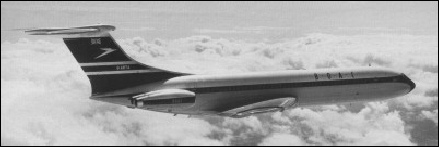 Finally, about 4 p.m. in the afternoon, the call came through and in a highly emotional state, Johnston told me I was to return to England immediately as Gary Owen had fallen and broken his hip. I argued that as it was Thursday evening, the earliest flight I could catch would be on Friday morning and this would not enable me to report to the office until Monday morning. Under the circumstances, I requested I be allowed to conduct my business in Beirut, fly to Amman on Friday evening to carry out my Central Bank work and then catch the VC 10 home on Sunday evening which would enable me to report to the office on Monday morning.
Finally, about 4 p.m. in the afternoon, the call came through and in a highly emotional state, Johnston told me I was to return to England immediately as Gary Owen had fallen and broken his hip. I argued that as it was Thursday evening, the earliest flight I could catch would be on Friday morning and this would not enable me to report to the office until Monday morning. Under the circumstances, I requested I be allowed to conduct my business in Beirut, fly to Amman on Friday evening to carry out my Central Bank work and then catch the VC 10 home on Sunday evening which would enable me to report to the office on Monday morning.
Very reluctantly, Johnston agreed but on the proviso that I should be in the office first thing on Monday morning. After a hectic weekend, I arrived home late on Sunday evening absolutely exhausted. As a result, I was a little late reporting to the office and was surprised to find no one there except the office ladies. A few minutes later, Nigel Cartwright, who had rejoined the department from Chatwood, walked into the office and expressed surprise at my presence as my trip schedule indicated that I would be away for a further week. I advised him of the telephone conversation with Johnston and asked where he was. To my amazement he said that Johnston had departed for Norway on Friday afternoon, as he had been invited to view some winter sports competition, by the local agent. Obviously, this was management of the highest order!
Finally, as the day for his retirement approached Frank Hall rang to congratulate me and wish me well. Johnston called me into his office to discuss my impending departure. He asked me how I felt about it and when I said I was greatly looking forward to the move, looked very serious and stated he felt it would be a retrograde step in my career. After a fairly aimless conversation that did nothing to change my mind, he dismissed me from his office and immediately departed himself. Less than an hour later my internal telephone rang; it was the boss himself, Bill Randall, instructing me to come up to his office. I felt certain it was to receive confirmation of my appointment to Birmingham but no, although he discussed the matter, it was to ask me to change my mind about going. Again, I gave my reasons for wanting the appointment. The chance to the run my own department, the increased responsibility, status and salary and last but not least, the oft stated company maxim that Home Sales Management experience was absolutely necessary to reach the top echelons of Chubb. Randall listened patiently then quietly told me Johnston had just been to see him and advised if I was transferred from the department, he could not be held responsible for any decline in export turnover. Randall said that in view of this he could not allow me to take the Birmingham post as the export turnover was very important to the company.
In spite of my protest that my career was being sacrificed for the foreseeable future as there was little chance of Gary Owen returning to the office in the short term, Randall would not budge. I had to swallow my disappointment, the bitter pill being sugared a little by the promise of a change in title to Deputy Export Manager and a small increase in salary. Unfortunately, the ultimate management symbol, a car, was not forthcoming. I soldiered on for the rest of the summer, virtually running the department for all the work Johnston was doing. My workload was such that I now had two secretaries working full-time for me - my own and Gary's lady, Kate Andrews. This inevitably lead to some acrimony between them and in the end, it got so bad that I had to ask Mrs Coggeshall to step in, which she did with a vengeance, moving my lady from the department. The net result was that Kate and I needed to work late on many evenings to keep abreast of the work.
The next amazing situation which arose in this almost dreamlike year, concerned John Woodhouse, our full-time representative in Singapore, then one of our main export markets. John was due to take eight weeks leave and it was felt that someone would need to cover for him. Naturally, I expected to be asked to do this, being the most experienced person in the export department and having first-hand knowledge of the area. Imagine my amazement therefore, to be advised by Johnny that he was going to Singapore and that I would be in charge during his eight-week absence! For convenience, I moved into the manager's office, which was so much more roomy than my own very restricted space. I must confess that it felt good being on the manager's side of the large desk, which I had sat round so often during morning prayers. I still travelled home with Reg Pilgrim, who lived nearby and one evening he asked me what news was on the company grapevine. At the time, there were rumours of various promotions which I recounted for him. He asked me if there was any other gossip. I could not think of anything further, other than the outrage in export at the manager's long absence. Eventually I told him mischievously and with a suitable air of mystery, there were rumours concerning Johnny's future. Reg said nothing so I let the matter drop.
Two days later, Leonard Dunham came into the office to ask me to despatch a fur coat to South Africa for Mrs Larke, the wife of the managing director. I made the necessary arrangements and then, as he was leaving, he turned and smiled, saying " I believe congratulations are in order". My face must have told the full story and he again smiled and stated that perhaps his remarks were a little premature. That evening on the way home, I told Reg that I was now convinced the rumour which I had made up was indeed true and that I was to be Export Manager. Reg quickly demanded to know on what I had based this information and hearing that the source was Leonard Dunham, confirmed this was so but begged me to say nothing further as Johnston had not yet been advised. The next day saw a procession of senior managers to my office all offering their congratulations but swearing me to silence. Dick Chapman had the task of breaking the news to Johnston and sent a telegram to Singapore, which was every bit as dramatic as Johnston's call to me in Beirut. He was not to contact anyone in the company until he arrived in London Airport, where Chapman would meet him personally. Chapman obviously felt the news would not be well-received -- Johnny was to go to city banking office -- and advised me to take a weeks leave to prevent any repercussions.
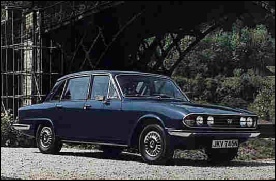 I was delighted as the promotion meant an enormous increase in salary and a company car of management status - a Triumph two litre saloon. At 36 years of age, I felt I had really arrived and could look forward to a golden future with Chubb.
I was delighted as the promotion meant an enormous increase in salary and a company car of management status - a Triumph two litre saloon. At 36 years of age, I felt I had really arrived and could look forward to a golden future with Chubb.
Stainless Steel Vault Door
De Haviland 104 Dove
Vickers Armstrong VC 10
Photo copyright BAE Systems
Home | Previous Page | ToP | Next Page
| Chubb 1818-1990s |
| Chatwood-Milner |
| Chubb Family |
| Early Sales/Offices/ChubbGroup/1980s & on |
| The Detector Mechanism |
| Photographs |
| Chubb Money Boxes |
| The Aubin Trophy |
| Lock Number 696 |
| Williams acqusition |
| Arthur Briant |
| Ibbs - Export is Fun |
| Peter Gunn |
| Back to Work |
| First Steps |
| My Export Career begins |
| The Happy Years |
| Export Manager |
| Back to The Midlands |
| Back to The Midlands - part 2 |
| Australia |
| The Midlands - again! |
| The Final Years |
| Conclusions |
| Slingsby Dart T51 Sailplane |
| Latest News |